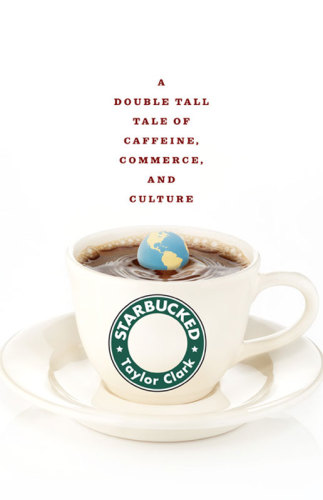
Starbucked
A Double Tall Tale of Caffeine, Commerce, and Culture
کتاب های مرتبط
- اطلاعات
- نقد و بررسی
- دیدگاه کاربران
نقد و بررسی

September 3, 2007
There's a double shot of skepticism in this account of Starbucks' ascendancy as “a permanent fixture in the global landscape” written by Clark, a Portland-based journalist, who's been mulling over Starbucks ever since the coffeehouse chain opened three branches in his small Oregon hometown. His coverage begins with a Seattle trio who set out to emulate the high-quality coffee of the California-based Peet's chain, before Howard Schultz took over the company and laid plans for its massive expansion. While Clark grudgingly admires Starbucks' ability to repackage coffee as “beverage entertainment” for a “hyperprosperous society in search of emotional soothing,” there's a lot he doesn't like about the company. He's convinced that Starbucks “diminishes the world's diversity” by ruthlessly outmaneuvering local competition on a global scale, and dubs the baristas' work as “a textbook McJob.” Even the quality of the coffee, he says, has gone downhill. Though Clark loses some of his focus by trying to rope in so many arguments against Starbucks, overall, his dubious perspective on one of the modern world's most ubiquitous icons is just frothy enough to prove entertaining.

December 15, 2007
Starbucks jolts awake 40 million customers a week and opens six new stores each day. Its 13,000 (and growing) stores can be found in 39 countries; notable locations include the Guantánamo Bay Naval Base in Cuba and by the Great Wall of China. In the first section of this stimulating account, journalist Clark chronicles the rise of the coffee giant and the mainstreaming of specialty coffee and café culture in America. In the second, he delves deeper into ethical issues surrounding Starbucks, from the plight of coffee growers in developing countries to the issues of cultural homogenization and corporate colonialization as Starbucks expands its operations around the world. Clark dispels as myths most of these gripes against the conglomeratehe argues that mom-and-pop coffee shops are actually helped by Starbucks!or as inevitable consequences of the company's success. Like John F. Love's "McDonald's: Behind the Arches" and Mark Pendergrast's "For God, Country, and Coca-Cola, " this is both history and balanced critique of a company that has become a cultural phenomenon. Recommended for all public libraries.Jennifer Zarr, NYPL
Copyright 2007 Library Journal, LLC Used with permission.

October 15, 2007
Alternately sentimental and competitive, Starbucks chief Howard Schultz dominates this minutely researched history of Americas latest supercorporation. Schultzs original intent of reproducing the Italian coffee bar experience in America and his determination to make Starbucks Americans third place after home and office powered the companys relentless expansion. Clark readily credits Starbucks for reviving coffee drinking among the younger generation and saving them from the truly horrific, cheap, and adulterated java their parents consumed. Critically observing Starbucks performance, Clark peppers his prose with gems of quotations and revealing incidents, such as the marketing science behind how Starbucks chooses locations. Clark explains why such early competitors as Peets never took off. He analytically scrutinizes whether a new Starbucks outlet is boon or bane, cause or effect of neighborhood gentrification. The impact of Starbucks on local coffeehouses turns out to be not necessarily as crushing as conventional wisdom had it, and cagey competitors have learned to exploit to their own profitable advantage the coffee culture that Starbucks has made fashionable.(Reprinted with permission of Booklist, copyright 2007, American Library Association.)

























دیدگاه کاربران